Unit 5 What are the shirts made of?Section A Grammar Focus - 4c课件(共25张PPT)
文档属性
| 名称 | Unit 5 What are the shirts made of?Section A Grammar Focus - 4c课件(共25张PPT) |  | |
| 格式 | pptx | ||
| 文件大小 | 625.9KB | ||
| 资源类型 | 教案 | ||
| 版本资源 | 人教新目标(Go for it)版 | ||
| 科目 | 英语 | ||
| 更新时间 | 2022-10-30 11:05:31 | ||
图片预览

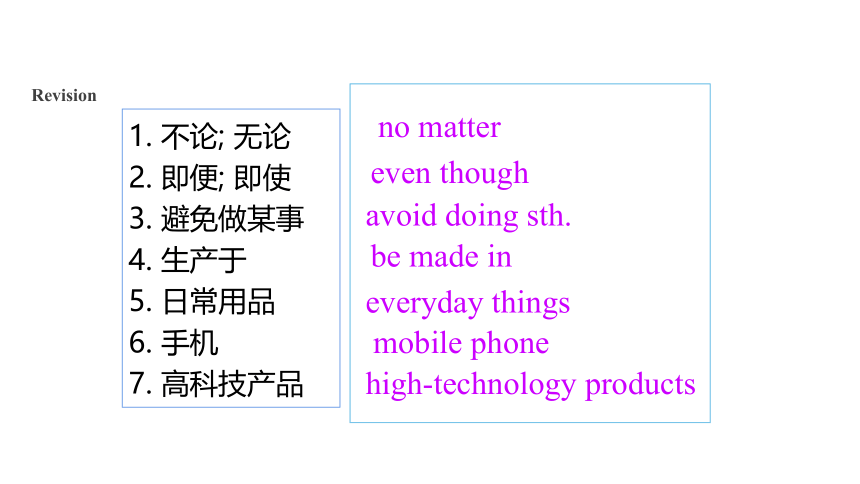
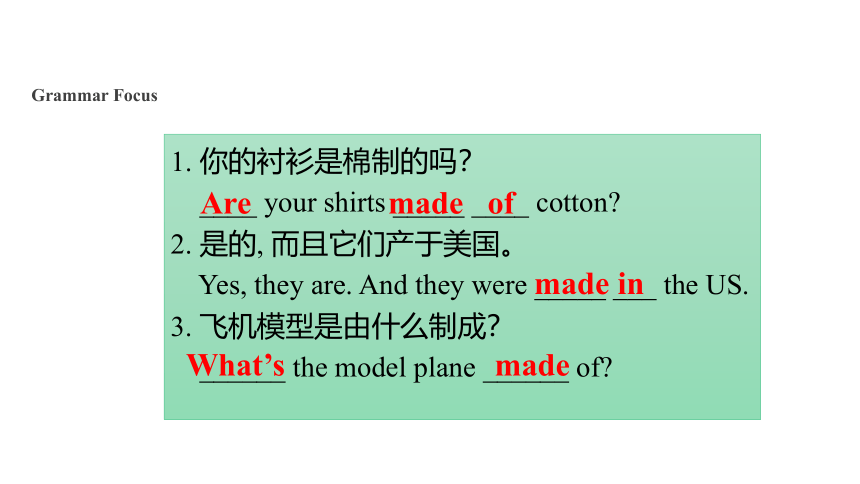
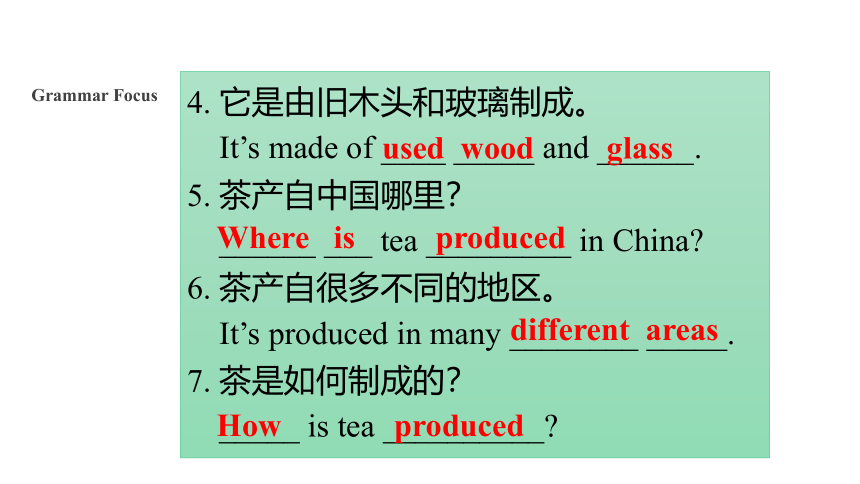
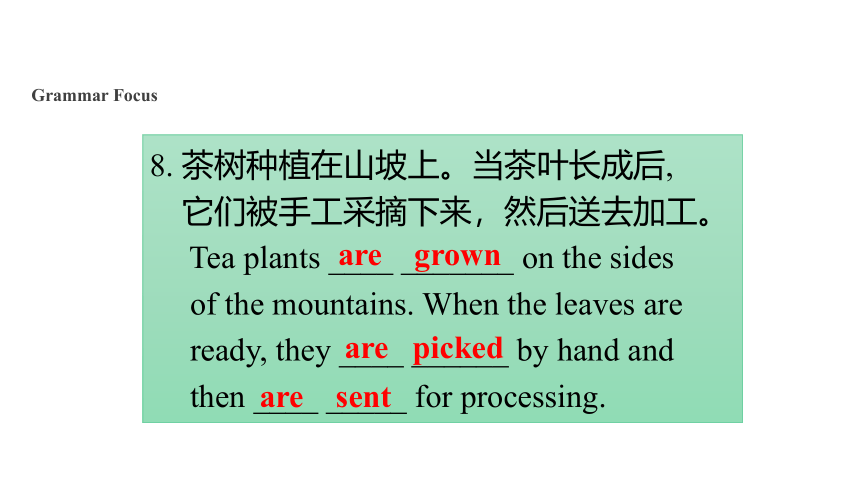
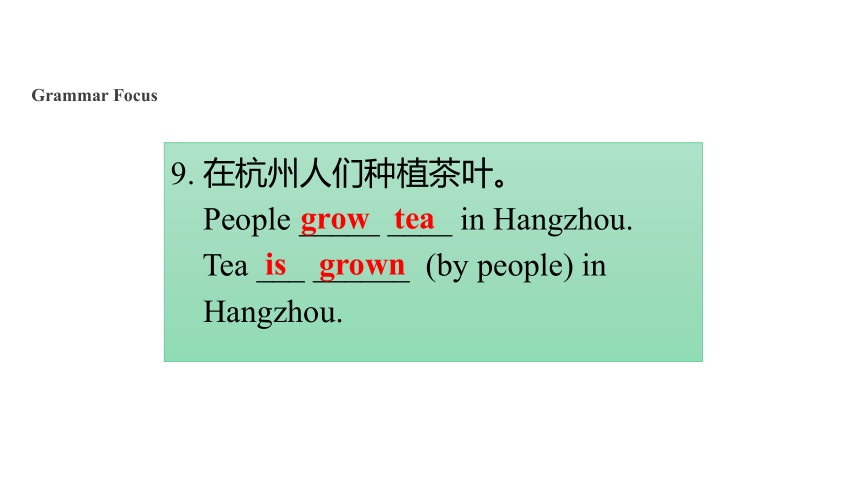
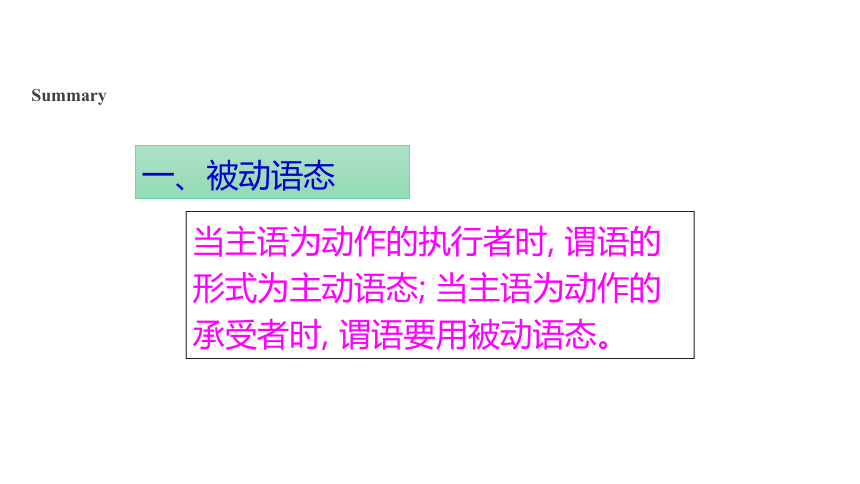
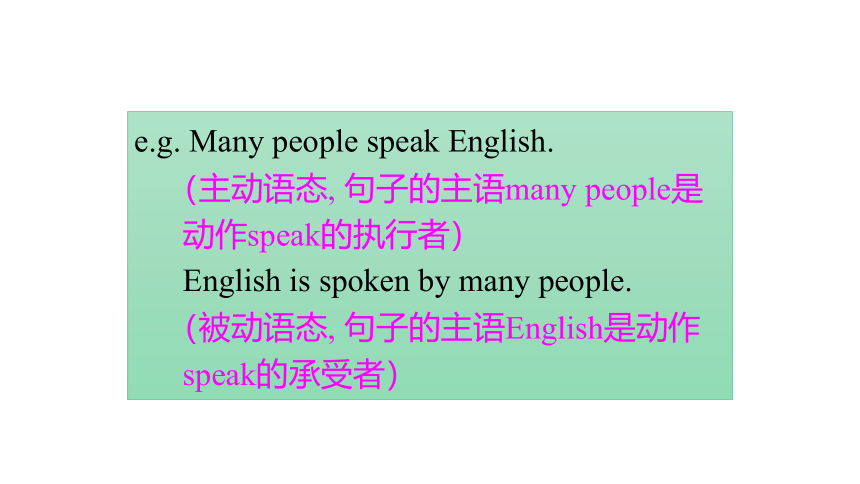
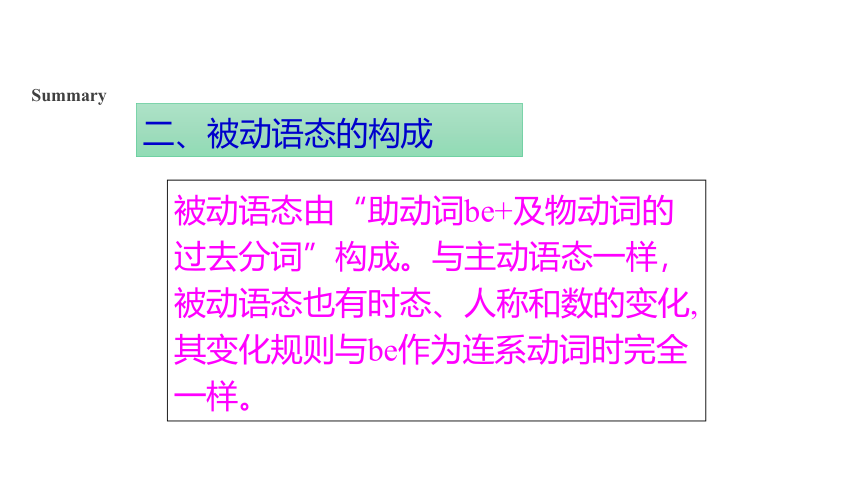
文档简介
(共25张PPT)
Period 3 Section A
Grammar Focus - 4c
1. 不论; 无论
2. 即便; 即使
3. 避免做某事
4. 生产于
5. 日常用品
6. 手机
7. 高科技产品
everyday things
even though
no matter
avoid doing sth.
be made in
mobile phone
high-technology products
Revision
1. 你的衬衫是棉制的吗?
____ your shirts _____ ____ cotton
2. 是的, 而且它们产于美国。
Yes, they are. And they were _____ ___ the US.
3. 飞机模型是由什么制成?
______ the model plane ______ of
made in
Are made of
What’s made
Grammar Focus
4. 它是由旧木头和玻璃制成。
It’s made of ____ _____ and ______.
5. 茶产自中国哪里?
______ ___ tea _________ in China
6. 茶产自很多不同的地区。
It’s produced in many ________ _____.
7. 茶是如何制成的?
_____ is tea __________
Where is produced
different areas
used wood glass
How produced
Grammar Focus
8. 茶树种植在山坡上。当茶叶长成后,
它们被手工采摘下来,然后送去加工。
Tea plants ____ _______ on the sides
of the mountains. When the leaves are
ready, they ____ ______ by hand and
then ____ _____ for processing.
are grown
are picked
are sent
Grammar Focus
9. 在杭州人们种植茶叶。
People _____ ____ in Hangzhou.
Tea ___ ______ (by people) in
Hangzhou.
grow tea
is grown
Grammar Focus
一、被动语态
当主语为动作的执行者时, 谓语的形式为主动语态; 当主语为动作的承受者时, 谓语要用被动语态。
Summary
e.g. Many people speak English.
(主动语态, 句子的主语many people是
动作speak的执行者)
English is spoken by many people.
(被动语态, 句子的主语English是动作
speak的承受者)
被动语态由“助动词be+及物动词的过去分词”构成。与主动语态一样,被动语态也有时态、人称和数的变化, 其变化规则与be作为连系动词时完全一样。
二、被动语态的构成
Summary
肯定式 否定式 疑问式
一般 现在时 I am asked … He/She is asked … We/You/They are asked … I am not asked… He/She is not asked… We/You/They are not asked … Am I asked …
Is he/she asked …
Are we/you /they asked …
Summary
4a
Complete the sentences with the correct forms of the verbs in brackets.
1. Children under 18 _____________
(not allow) to watch this show
without their parents.
aren’t allowed
Practice
2. We ________ (pay) by the boss on
the last Friday of each month.
3. A: What language ___________
(speak) in Germany
B: Most people speak German, but
many can speak English, too.
are paid
n. 老板; 上司
is spoken
德国
Practice
4. Most of the earth’s surface
___________ (cover) by water.
5. The classroom _________ (clean) by
the students every day.
is covered
is cleaned
n. 表面; 表层
Practice
4b
Rewrite the sentences using the passive voice.
1. Farmers plant the tea on the sides of mountains.
_____________________________
_____________________________
The tea is planted on the sides of mountains by farmers.
Practice
点拨:将主动语态变为被动语态时,应先确定句子的谓语动词,并找出句子的宾语。然后,将句子的宾语变成被动句的主语,将谓语动词变成be + v.-ed形式。
Practice
2. This shop uses the best materials to
make dresses.
________________________________
________________________________
1) 主动句的谓语动词为use, 宾语是the
best materials。
2) 将the best materials作被动句的主语, 谓语动词改为are used的形式。
The best materials are used by this shop to make dresses.
n. 材料; 原料
Practice
3. Careless driving causes many traffic
accidents.
________________________________
________________________________
4. The postman brings letters and
postcards to people’s home.
_______________________________
_______________________________
Letters and postcards are brought to people’s home by the postman.
Many traffic accidents are caused by careless driving.
n. 交通; 路上行驶的车辆
n. 邮递员
Practice
5. Our family does not use this silver plate
very often.
________________________________
________________________________
This silver plate isn’t used very often by our family.
Practice
Ask five classmates about something they are wearing or have in their schoolbags. The list of words below may help you.
pencil, jacket, sweater, T-shirt, shoes, cap, gloves, ring…
4c
n. (尤指有帽舌的) 帽子
n. (分手指的) 手套
Practice
What’s your pencil made of
It’s made of wood.
Where was it made
It was made in Shanghai.
Practice
What’s your jacket made of
It’s made of silk.
Where was it made
It was made in Hangzhou.
Practice
What’s your T-shirt made of
It’s made of cotton.
Where was it made
It was made in Beijing.
Practice
What’s your gloves made of
It’s made of wool.
Where was it made
It was made in Neimeng.
Practice
What’s your ring made of
It’s made of silver.
Where was it made
It was made in Guangzhou.
Practice
请将下列句子变成被动语态。
1. We use computers to search information.
2. The teacher often repeats the story.
3. They don’t allow fishing here.
4. Bill looks after his cat carefully.
5. We don’t often speak English at home.
Homework
Period 3 Section A
Grammar Focus - 4c
1. 不论; 无论
2. 即便; 即使
3. 避免做某事
4. 生产于
5. 日常用品
6. 手机
7. 高科技产品
everyday things
even though
no matter
avoid doing sth.
be made in
mobile phone
high-technology products
Revision
1. 你的衬衫是棉制的吗?
____ your shirts _____ ____ cotton
2. 是的, 而且它们产于美国。
Yes, they are. And they were _____ ___ the US.
3. 飞机模型是由什么制成?
______ the model plane ______ of
made in
Are made of
What’s made
Grammar Focus
4. 它是由旧木头和玻璃制成。
It’s made of ____ _____ and ______.
5. 茶产自中国哪里?
______ ___ tea _________ in China
6. 茶产自很多不同的地区。
It’s produced in many ________ _____.
7. 茶是如何制成的?
_____ is tea __________
Where is produced
different areas
used wood glass
How produced
Grammar Focus
8. 茶树种植在山坡上。当茶叶长成后,
它们被手工采摘下来,然后送去加工。
Tea plants ____ _______ on the sides
of the mountains. When the leaves are
ready, they ____ ______ by hand and
then ____ _____ for processing.
are grown
are picked
are sent
Grammar Focus
9. 在杭州人们种植茶叶。
People _____ ____ in Hangzhou.
Tea ___ ______ (by people) in
Hangzhou.
grow tea
is grown
Grammar Focus
一、被动语态
当主语为动作的执行者时, 谓语的形式为主动语态; 当主语为动作的承受者时, 谓语要用被动语态。
Summary
e.g. Many people speak English.
(主动语态, 句子的主语many people是
动作speak的执行者)
English is spoken by many people.
(被动语态, 句子的主语English是动作
speak的承受者)
被动语态由“助动词be+及物动词的过去分词”构成。与主动语态一样,被动语态也有时态、人称和数的变化, 其变化规则与be作为连系动词时完全一样。
二、被动语态的构成
Summary
肯定式 否定式 疑问式
一般 现在时 I am asked … He/She is asked … We/You/They are asked … I am not asked… He/She is not asked… We/You/They are not asked … Am I asked …
Is he/she asked …
Are we/you /they asked …
Summary
4a
Complete the sentences with the correct forms of the verbs in brackets.
1. Children under 18 _____________
(not allow) to watch this show
without their parents.
aren’t allowed
Practice
2. We ________ (pay) by the boss on
the last Friday of each month.
3. A: What language ___________
(speak) in Germany
B: Most people speak German, but
many can speak English, too.
are paid
n. 老板; 上司
is spoken
德国
Practice
4. Most of the earth’s surface
___________ (cover) by water.
5. The classroom _________ (clean) by
the students every day.
is covered
is cleaned
n. 表面; 表层
Practice
4b
Rewrite the sentences using the passive voice.
1. Farmers plant the tea on the sides of mountains.
_____________________________
_____________________________
The tea is planted on the sides of mountains by farmers.
Practice
点拨:将主动语态变为被动语态时,应先确定句子的谓语动词,并找出句子的宾语。然后,将句子的宾语变成被动句的主语,将谓语动词变成be + v.-ed形式。
Practice
2. This shop uses the best materials to
make dresses.
________________________________
________________________________
1) 主动句的谓语动词为use, 宾语是the
best materials。
2) 将the best materials作被动句的主语, 谓语动词改为are used的形式。
The best materials are used by this shop to make dresses.
n. 材料; 原料
Practice
3. Careless driving causes many traffic
accidents.
________________________________
________________________________
4. The postman brings letters and
postcards to people’s home.
_______________________________
_______________________________
Letters and postcards are brought to people’s home by the postman.
Many traffic accidents are caused by careless driving.
n. 交通; 路上行驶的车辆
n. 邮递员
Practice
5. Our family does not use this silver plate
very often.
________________________________
________________________________
This silver plate isn’t used very often by our family.
Practice
Ask five classmates about something they are wearing or have in their schoolbags. The list of words below may help you.
pencil, jacket, sweater, T-shirt, shoes, cap, gloves, ring…
4c
n. (尤指有帽舌的) 帽子
n. (分手指的) 手套
Practice
What’s your pencil made of
It’s made of wood.
Where was it made
It was made in Shanghai.
Practice
What’s your jacket made of
It’s made of silk.
Where was it made
It was made in Hangzhou.
Practice
What’s your T-shirt made of
It’s made of cotton.
Where was it made
It was made in Beijing.
Practice
What’s your gloves made of
It’s made of wool.
Where was it made
It was made in Neimeng.
Practice
What’s your ring made of
It’s made of silver.
Where was it made
It was made in Guangzhou.
Practice
请将下列句子变成被动语态。
1. We use computers to search information.
2. The teacher often repeats the story.
3. They don’t allow fishing here.
4. Bill looks after his cat carefully.
5. We don’t often speak English at home.
Homework
同课章节目录
- Unit 1 How can we become good learners.
- Section A
- Section B
- Unit 2 I think that mooncakes are delicious!
- Section A
- Section B
- Unit 3 Could you please tell me where the restroom
- Section A
- Section B
- Unit 4 I used to be afraid of the dark.
- Section A
- Section B
- Unit 5 What are the shirts made of?
- Section A
- Section B
- Review of Units 1-5
- Unit 6 When was it invented?
- Section A
- Section B
- Unit 7 Teenagers should be allowed to choose their
- Section A
- Section B
- Unit 8 It must belong to Carla.
- Section A
- Section B
- Unit 9 I like music that I can dance to.
- Section A
- Section B
- Unit 10 You're supposed to shake hands.
- Section A
- Section B
- Review of Units 6-10
- Unit 11 Sad movies make me cry.
- Section A
- Section B
- Unit 12 Life is full of the unexpected
- Section A
- Section B
- Unit 13 We're trying to save the earth!
- Section A
- Section B
- Unit 14 I remember meeting all of you in Grade 7.
- Section A
- Section B
- Review of Units 11-14
